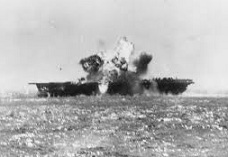Japanese is where we can establish the etymological origin of the term kamikaze that concerns us now. Specifically, we can establish that it was formed from the sum of two lexical components of said language:
-The noun "kami", which can be translated as "God".
-The word «kaze», which is synonymous with «wind» or «breath».
That original word can be literally translated as "divine wind" , according to what is indicated by the Royal Spanish Academy ( RAE ).
 The notion arose in World War II . The Japanese pilots who crashed planes loaded with explosives against different targets, committing suicide with the attack , were called kamikazes. This is also the name of the planes that these suicide pilots manned.
The notion arose in World War II . The Japanese pilots who crashed planes loaded with explosives against different targets, committing suicide with the attack , were called kamikazes. This is also the name of the planes that these suicide pilots manned.
It is interesting to note that, in Japan , this name was not used. This use of the idea of kamikaze was coined by the Americans.
The kamikazes were a special unit of the Imperial Japanese Navy . They were generally launched against Allied ships advancing through the Pacific Ocean towards Japanese territory.
With the Japanese surrender at the end of World War II , the special kamikaze unit was disbanded. The last such attack took place on August 15, 1945 .
Although it is considered that the origin of the term is found in the Second World War, we have to establish that there are other theories that state that, in reality, it is in the 13th century. Specifically, they indicate that in the year 1274, when Kublai Khan and the Mongols sent a naval fleet to invade Japan, they encountered the fact that the Japanese prayed to the gods for their salvation and a typhoon occurred that destroyed the aforementioned fleet. Thus, they decided to call this typhoon "wind of God."
And that same circumstance occurred a few years later, in 1281, when Khan tried again to invade Japan. He couldn't do it because another new typhoon appeared.
Currently, any suicide bomber, regardless of his nationality, is known as a kamikaze. Above all, terrorists are named in this way: those who carried out the attacks of September 11, 2001 in the United States , for example, are mentioned as kamikazes.
He who performs a reckless act , putting his life at risk, is also usually called a kamikaze: «Look at that kamikaze! He's riding his motorcycle with a blindfold on," "You have to be a kamikaze to try to climb the mountain without ropes," "In the middle of the ride, a kamikaze jumped out of the boat to swim with the sharks."
In the same way, we have to point out that "Kamikaze" is one of the best-known songs by the Spanish group Amaral, made up of Eva Amaral and Juan Aguirre. It was the single that led the album titled "Gato negro, Dragón Rojo", which was published in 2008 and is made up of a total of nineteen songs.
